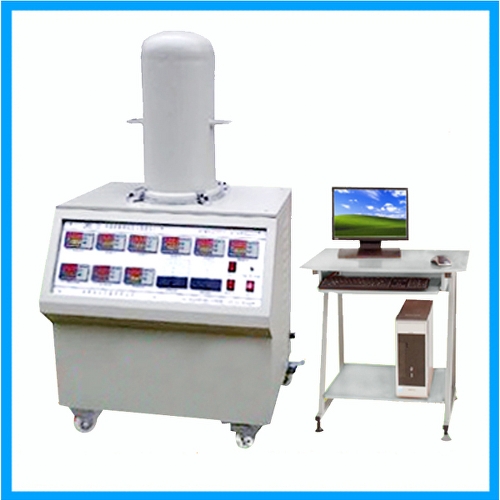
OVERVIEW
Product summary:
This machine test thin conductor of heat, and solid electrical insulating materials, thermal grease, resin, rubber, beryllium oxide eramic, alumina ceramic materials such as thermal resistance and solid at the interface thermal contact resistance and thermal conductivity of the material. The test material for solid-state sheet, the Enclosing box can detect the powder state materials and paste material.
Standards:
1.MIL-I-49456A (Insulating sheet, the thermal conductivity of resin, the thermal conductivity of glass fiber reinforced)
2.GB 5598-85 (Determination of Beryllium Oxide ceramic thermal conductivity)
3.ASTM D5470-2006 (Thin thermal conductivity of solid electrical insulating materials, heat transfer performance testing standards)
4.CPCA4105-2010
- ISO 8301:1991 and ISO 8302:1991
Instrument features:
With automatic compression, automatic thickness measuring device, and connect the computer to achieve automatic control. The instrument uses temperature gradient detection, improve the accuracy of the test. Can detect multiple parameters of the thermal resistance curves under different pressures, optimized mathematical model to measure the thermal conductivity and thermal resistance of materials and the interface thermal contact resistance.
Applicable industry:
Widely used in universities, research institutes, quality inspection departments, and production of plant material thermal conductivity detection.
Technical parameters:
| Sample size | diameter< 30mm |
| sample thickness | 0.02-20mm |
| Extreme heat temperature range | RT-299.99°C |
| The extremely cold temperature range | 0-99.00°C |
| Thermal conductivity of the test range | 0.01~50W/m*k,1~300W/m*k |
| Thermal Resistance Test Range | 0.05~0.000005m2*K/W |
| Pressure measurement range | 0~1000N |
| Displacement measuring range | 0~30.00mm |
| Test accuracy | 3% |
1,The sample under vacuum test, to ensure that the test environment and precision degree of vacuum 0.1MPa.
2,Experimentally:a, Thermal resistance test specimens of different pressure.
b, Material thermal conductivity test.c,The contact resistance test.
3,Computer automatic testing and data printout.
